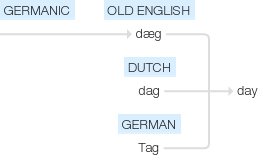Day
Old English dæg, of Germanic origin; related to Dutch dag and German Tag .
wiktionary
From Middle English day, from Old English dæġ(“day”), from Proto-West Germanic *dag, from Proto-Germanic *dagaz(“day”), from Proto-Indo-European*dʰogʷʰ-o-s, from *dʰegʷʰ-(“to burn”).
Cognate with Saterland Frisian Dai(“day”), West Frisian dei(“day”), Dutch dag(“day”), German Low German Dag(“day”), Alemannic German Däi(“day”), German Tag(“day”), Swedish, Norwegian and Danish dag(“day”), Icelandic dagur(“day”), Gothic 𐌳𐌰𐌲𐍃( dags, “dags”). Cognate also with Albanian djeg(“to burn”), Lithuanian degti(“to burn”), Tocharian A tsäk-, Russian жечь(žečʹ, “to burn”) from *degti, дёготь(djógotʹ, “tar, pitch”), Sanskrit दाह(dāhá, “heat”), दहति(dáhati, “to burn”), Latin foveō(“to warm, keep warm, incubate”).
Latin diēs is a false cognate; it derives from Proto-Indo-European *dyew-(“to shine”).
etymonline
day (n.)
Old English dæg "period during which the sun is above the horizon," also "lifetime, definite time of existence," from Proto-Germanic *dages- "day" (source also of Old Saxon, Middle Dutch, Dutch dag, Old Frisian di, dei, Old High German tag, German Tag, Old Norse dagr, Gothic dags), according to Watkins, from PIE root *agh- "a day." He adds that the Germanic initial d- is "of obscure origin." But Boutkan says it is from PIE root *dhegh- "to burn" (see fever). Not considered to be related to Latin dies (which is from PIE root *dyeu- "to shine").
Meaning originally, in English, "the daylight hours;" it expanded to mean "the 24-hour period" in late Anglo-Saxon times. The day formerly began at sunset, hence Old English Wodnesniht was what we would call "Tuesday night." Names of the weekdays were not regularly capitalized in English until 17c.
From late 12c. as "a time period as distinguished from other time periods." Day-by-day "daily" is from late 14c.; all day "all the time" is from late 14c. Day off "day away from work" is attested from 1883; day-tripper first recorded 1897. The days in nowadays, etc. is a relic of the Old English and Middle English use of the adverbial genitive.
All in a day's work "something unusual taken as routine" is by 1820. The nostalgic those were the days is attested by 1907. That'll be the day, expressing mild doubt following some boast or claim, is by 1941. To call it a day "stop working" is by 1919; earlier call it a half-day (1838). One of these days "at some day in the near future" is from late 15c. One of those days "a day of misfortune" is by 1936.
